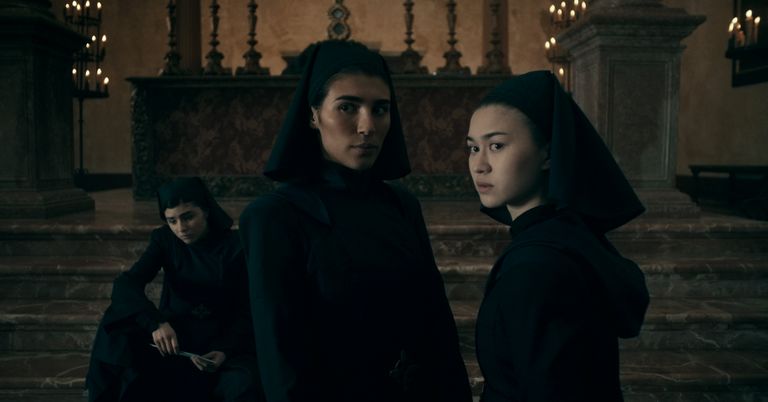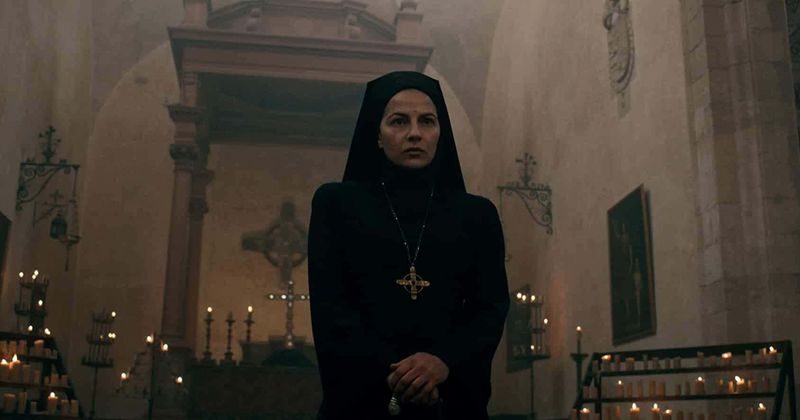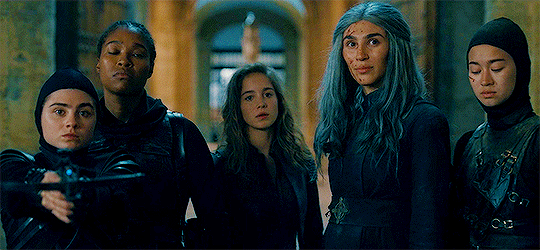- Warrior Nun Struggles As a Trauma Narrative (Part 1)
- Warrior Nun Struggles As a Trauma Narrative (Part 2)
- Warrior Nun Struggles As a Trauma Narrative (Part 3)
- Warrior Nun Struggles As a Trauma Narrative (Part 4)
- Warrior Nun Struggles As a Trauma Narrative (Part 5)
Content warning: discussions of child abuse and suicide
Spoiler Warning for Warrior Nun
Introduction:
As I discussed in my last article, Warrior Nun has laid the groundwork for a compelling story on overcoming abuse and trauma, particularly within a religious context. But the writers will need to address some issues in season two in order to do justice for all of its characters and for Ava’s arc as a perky orphan with abandonment issues who grows into a capable leader. These issues relate to how the Sisters of the Order of the Cruciform Sword (OCS) mistreat Ava, after kidnapping her, mind you, and how they recreate the abuse she suffered at the hands of Sister Francis. Sister Francis having been Ava’s caregiver at the orphanage she had to call home and who murdered Ava. Overall, the Ava that we see in episodes 1×03-1×06 is an Ava distrustful of the OCS because its entire approach in 1×03-1×05 has only been one giant trigger for her. These issues also reflect how ‘non-survivor privilege’ has helped to create media that does not examine difficult questions about victimization and favors storylines that do not shake the status quo.
‘Non-survivor privilege’ refers to a concept that not having survived interpersonal trauma protects a person from questioning oppressive systems and shields them from the subsequent social upheaval. Jennifer Kesler coined the term in 2008 for a blog post so she could better articulate a particular rage that survivors experience, but I am applying it to media analysis.
In Warrior Nun non-survivor privilege shapes how the Sisters’ perception of Ava goes unexamined and how Ava’s mistreatment gets brushed aside once she rejoins the group in the second half of the season. While the OCS’s actions would be egregious no matter who they kidnapped, the Sisters repeatedly calling Ava selfish is infuriating to watch because we are watching them shame her for not capitulating to the kind of abuse she endured from Sister Francis… and then some. The later episodes, especially 1×08-1×10, frame Ava’s rejoining the group as her finally having found a family, and the Sisters do come to see her as one of their own and stop shaming her for hesitancy about being the Warrior Nun. And that is fine, it’s great actually. I could slurp down found family tropes all day long. The problem centers around the fact that the narrative never questions the OCS or holds Mary, Beatrice, Lilith, or Mother Superion accountable.
Why Ava Runs From the OCS:
In general, the OCS accuses Ava of selfishness for perfectly rational and not-selfish decisions because she refuses to conform to a life she never chose and which they foisted onto her with little explanation. Episode 1×03 opens as Ava wakes up after the nuns had drugged her the previous episode, and as she comes to, she can’t move, believing that she’s back to being paralyzed. She also overhears Beatrice and Lilith discussing the halo, and Lilith dismisses Ava’s right to life, firmly advocating that they risk killing her to retrieve the halo. Thus, her introduction to the Order of the Cruciform Sword echoes her traumatic introduction to St. Michael’s orphanage and to her new life as a resurrected, able-bodied woman, as well as all the abuse in-between. Sister Francis derided her as a ‘burden’ during that time, and now the OCS is plotting how they could use her body like an involuntary organ donor. Understandably, Ava isn’t gung-ho to join another Church-based community, and from a psychological standpoint, her trauma-tuned alarms are blaring in her head, reminding her that the OCS isn’t an organization she can trust.
For one thing, the OCS headquarters at a church called the Cat’s Cradle, and those with trauma-related backgrounds tend to have triggers related to places of repeated traumatization. The physical stimuli of the Cat’s Cradle have echoes of St. Michael’s orphanage because they both operate as part of the Catholic Church and primarily employ nuns rather than priests. As I mentioned in my last article, Ava’s storyline and possible triggers fall under Religious Trauma Syndrome (RTS), a trauma-based disorder similar to P.T.S.D. A 2015 study linked triggers to geography:
“[R]esearchers at New York University […] found that a singular traumatic experience is enough to rattle someone, but rarely takes them down. However, the researchers found that a second subsequent trauma that is unpredictably linked to the first can be the ‘straw that breaks the camel’s back’ and results in post-traumatic stress disorder.”
Ava absolutely has multiple traumas rooted in St. Michael’s because of her twelve-year stint there, and her subsequent traumas that occur in the first three episodes center around either a religious location or the actions of church officials. In season two, it would be nice if the writers addressed how being in another church is essentially activating any and all the triggers for Ava.
Episode 1×03 ‘Ephesians 6:11’ focuses on Ava’s time in the Cat’s Cradle before Duretti takes over, and the OCS does nothing to make her feel safe and welcomed, let alone valued as a person.
Father Vincent shows Ava around the Cat’s Cradle and explains the group’s origin and mission to her, and whenever she mentions her autonomy, he sidesteps her concerns and goes back to her importance as their Warrior Nun. She explicitly tells him that she isn’t ready to commit to being a Warrior Nun and will need time to think it over; she makes her need for space clear. Father Vincent proceeds to tell her that she cannot leave the grounds, and the camera then focuses on the gates being closed, Ava’s face distressed as she realizes the depth of her imprisonment. Then, when she reminds Father Vincent that the OCS kidnapped her, he hears her but won’t verbally acknowledge the crime, and he subtly discourages her capabilities, reminding her that demons will find her and hunt her down. (We love emotional manipulation!)
When we see Ava next, she meets Mother Superion and Lilith for sparring practice. Neither nun treats her well, and Lilith even begins the fight by coming at Ava from behind, knocking her off her feet for ‘swearing’. She then slams her staff right beside Ava’s head to reinforce the rule and to reinforce Ava’s vulnerability, the sound of it hitting the mat like a whip’s crack. Viewers will also recognize that Lilith is driven by ambition and pride, and she resents Ava for bearing the halo, seemingly usurping Lilith’s destiny, and so viewers will pick up on the subtext of aggression and resentment when she hears Ava talk about her powers. And while Ava may not know about Lilith’s background, she knows that Lilith was willing to kill her to retrieve the halo. She could connect the dots between Lilith’s aggression and her safety. Later, Lilith uses the only weapon that can hurt a Warrior Nun to slash Ava’s arm so as to teach her that she’s not “invincible”. Ava yells out in pain and dejectedly says, “Hey, I thought we were bonding.” These sudden attacks, the possibility that she could hurt Ava at any time, do nothing but to further sow distrust between Ava and the OCS. Furthermore, she tricks Ava into thinking that they are being attacked by a demon, and when Ava flees in fear, Lilith and Mother Superion shame her for not standing her ground.
Mother Superion confronts Ava about running away from the demon and about running away in general. She accuses Ava of having committed suicide because of her disability and isolation, having read Ava’s file from the orphanage, and demands Ava to figure out if she wants to live or die. She also slips into the classic Catholic manipulation and guilt, saying, “You’re a coward. Always looking for the easy way out. Fighting for a cause? That’s not you, is it?” Again, to reiterate, she verbally lambasted a young woman that she believed had recently killed herself. The OCS does not handle trauma well, to say the least, which flies in the face of the fact that every nun there comes there with baggage and secrets to match.
In the next scene, after Father Vincent confronts Mother Superion about her conduct, she asserts, “She’s not one of us. She’s a sinner. She killed herself. […] I see an aberration.” Her sentiment echoes Sister Francis, as the latter in 1×01 referred to Ava as being “spawned” by her family. “Spawned” and “aberration” both have dehumanizing connotations, and even though Ava is not present for this conversation, Mother Superion telegraphs her distrust, resentment, and general dislike of Ava a la Sister Francis pretty loudly throughout the whole episode. It is no wonder that Ava runs at the first chance she gets and why she continues running from Lilith and Mary in subsequent episodes.
Episode 1×03 concludes with Ava escaping via Father Vincent’s office, the barred windows resurrecting the prison imagery from the first episode. In 1×03 the OCS promises Ava a found family while instead negating any reason she could have to possibly trust it and its members. For all intents and purposes, Ava escaping the Cat’s Cradle is her second escape from the Catholic Church.

Resisting the Torturing of the Soul:
When Warrior Nun premiered last July, showrunner Simon Barry posted to Instagram a character poster of Ava. He captioned it, “[Ava] is the beating heart and tortured soul of #WarriorNun[.]” Throughout the whole season, we see these dual sides of Ava’s personality and how they express themselves as coping mechanisms. The Sisters call Ava selfish and cowardly when in actuality Ava has been anything but the whole time, even from the beginning after she had escaped an abusive institution and had almost no loving people in her life. Her running from the OCS does not mean cowardice or an inability to commit but a persistence to not relive her time at St. Michael’s.
Some of Ava’s actions and general behavioral traits fall into specific trauma responses, and these psychological tricks help protect her spirits, preserving her deep-rooted empathy. Generally speaking, the stress responses of fight versus flight is well-known. But there are actually four, the latter two more associated with feminism and trauma studies due to how prevalent these responses are in sexual assault cases. Counselor Pete Walker outlines the four F types of stress and trauma that shape our coping mechanisms:
“Fight types avoid real intimacy by unconsciously alienating others with their angry and controlling demands for the unmet childhood need of unconditional love; flight types stay perpetually busy and industrious to avoid potentially triggering interactions; freeze types hide away in their rooms and reveries; and fawn types avoid emotional investment and potential disappointment by barely showing themselves – by hiding behind their helpful personas, over-listening, over-eliciting or overdoing for the other – by giving service but never risking real self-exposure and the possibility of deeper level rejection.”
Walker describes each type in more detail for his 2013 book, Complex PTSD, and notes, “Most trauma survivors are also hybrids of the 4F’s. Most of us have a backup response that we go to when our primary one is not effective enough,” (p. 123). In my opinion, Ava exhibits a flight-freeze hybrid response.
In his book, Walker explains how the flight response comes from the left brain, engineering mental and physical business as a distraction, while the freeze response comes from the right brain, leading to various forms of dissociation. Freezing includes the hundred-yard-stares and emotional numbing. He cites “right-brain-dominant activities like TV, [and] online browsing” (p. 118) as manifestations of the freeze response, and Ava mentioned in the show that she watched a lot of TV. Between her 1984 poster and interest in Jillian Salvius’s work, Ava demonstrates an intellectual, creative curiosity that she must have channeled into reading. Freezing also works as her trauma response because of her physical immobility for most of her life and general social isolation.
That being said, Ava’s tendency to run while dealing with the Sisters reflects a flight type. From the voiceovers, particularly at the beginning of the season, we hear in real-time Ava’s racing thoughts and constant analysis of her environment, which could be read as a partial distraction from her deeper, more emotionally-charged thoughts and feelings. It makes sense that once Ava regained the ability to walk, she would tap into her flight response, as that seemed to be an element of her psychologically-based survival. We see this hybridized trauma response when Ava uses her powers. Her main power as the Warrior Nun, outside of healing, is her phasing ability. It allows her to escape any confined space, but if she becomes too overwhelmed, she freezes up. That response comes out most clearly when she is practicing to enter Adriel’s tomb in 1×08. She will escape until she can’t, and then she risks shutting down.
Ava’s Heart Has Always Been Beating Hard:
Episode 1×04 traces her relationship with Sister Francis through flashbacks. In her second memory, Ava experiences menarche, bleeding into the sheets. (It was a nice surprise that a genre show like Warrior Nun acknowledged that some disabled women menstruate and have to navigate that experience needing help from others.) Her and Sister Francis’s subsequent conversation reveals how when it comes to toxic relationships, there is nothing that the target can do right:
“You’re a woman now. So, could you at least try to be anything but a burden to everyone around you?”
“But I am trying, Sister Francis. Look what I taught myself to do.” She proceeds to twitch her fingers.
Sister Francis only growls, “Sure, what’s the use of that?”
After Sister Francis dismisses Ava’s progress, the girl gets snarky and flips her off. This moment encapsulates Ava’s primary coping mechanisms outside her general trauma responses. Ava fought back verbally, relying on her wit for “little victories” to sustain her spirit. It would be pointless if she relied on fawning because Sister Frances reduced her to a “burden” and that defined their relationship.
As an abuse survivor in an oppressive institution like the Catholic Church, Ava’s joy is her biggest defiance. She channels her puppy-like personality through witty humor and insights and through indiscriminate compassion.

Her wit comes from Ava being able to process information very quickly and then filtering it through humor, whether intentional or not, and a few examples appear in the first episode when Ava interacts with J.C.’s group. As she meets the gang, chowing down thanks to J.C.’s cooking skills, she almost immediately suggests that the group is ‘squatting’, but she doesn’t take her idea seriously, posing it as a joke. The group becomes uncomfortable, and it’s revealed that she pegged them correctly. This sets off a pattern of Ava’s characterization: she demonstrates a strong intuition and read of a situation, but because it comes naturally to her, and because she was likely denigrated by Sister Francis for any intellectual independence, she delivers her insight through humor and in general a lighthearted tone. Ava does not see herself accurately; she doesn’t see or sound like the archetypal stoic intellectual, as we see in Beatrice, so she doesn’t consider herself as having ‘smart’ ideas.
Later, when she and J.C. discuss the group’s moral code regarding who they target for squatting, Ava stares at her himbo as he rambles. She jumps back in mid-conversation, yet gives a cogent, insightful answer on a corrupt society: “Institutions. I hate them. You know, they focus power in one direction, and everyone under them is just abused.”
(Is Ava secretly a polisci major? And can season two include a scene where Beatrice is beside herself with feelings because Ava whoops everyone’s expectations of her intelligence?)
She also immediately offers her help to J.C. when he mentions that he and his rowdy band of boozers are “pushing back” against the system. While it could be argued that she only offered to help to better her chances with her crush, I think it reflects that instinctively, Ava is a smart, helpful, and compassionate person; a nature that the OCS disputed because Ava refused to capitulate to the institution that facilitated her abuse. We see shades of this later in the same episode and in 1×02. In the former, she is mature enough to ask JC for help due to her lack of life experiences, clearly communicating her vulnerabilities. She then risks being imprisoned by Jillian Salvius’s people in 1×02, as she and J.C. sneak into a lab party, and she then stays behind to find a potentially trapped child.
Her natural empathy and related intuitive intelligence contradict the OCS’s accusations of selfishness. One of the reasons that Ava’s relationship with the Sisters can be so frustrating is because of this, because the narrative shows us a compassionate character whose retraumatization goes unacknowledged by the show. Warrior Nun misleads its audience as it weighs in favor of the Sisters’ misinterpretation of Ava’s character since the show never addresses the mistreatment for what it is.
This is especially frustrating as the show’s structure, at a glance, is well-suited for a story about navigating trauma. Warrior Nun’s push-and-pull storyline, which many people disagreed with, actually worked as an expression of Ava’s two main coping mechanisms — resisting further abuse and exploring the small, daily joys of normal life.
In his Warrior Nun article, Bo argued for the show’s pacing and quieter early episodes. Shows dealing heavily with trauma require narratives that make room for slower episodes in order to seed character moments and to give characters room to unpack traumas and to process past abuses, the slow unwinding that is uncovering the mystery. One of the best examples of this structure in recent years, in my opinion, is Sharp Objects. HBO’s Southern Gothic mystery also deals with the murder of children, abusive mother figures, and a female ‘Angel of Death’. Confronting an abusive parent as the root cause of one’s trauma takes time, and that time includes all the avoidance that the protagonist engages in. In Sharp Objects, the protagonist engaged in various self-destructive habits like alcoholism. Warrior Nun differs from a trauma narrative like Sharp Objects because Ava’s avoidance stems not from an unhealthy coping mechanism but from her recent resurrection and yearning to live a normal, fulfilling life. She starts to address her murder not even halfway through the season as the last flashback from 1×04 helps Ava realize that she didn’t die of natural causes or from suicide.
And from a narrative standpoint, Ava would not make that realization in the first episode because she has so much to process because of the whole being resurrected fact and having her mobility restored. She has too much exploring and living to do, and when the OCS repeatedly comes after her, she runs in turn. The slower, back-and-forth pacing of the show, therefore, enhances Ava’s psychological reality and gives her time to process some of what has happened. And her psychological reality includes starts and stops as she keeps moving from one question to another, from one life experience to the next.
~
While I mentioned all of the Sisters’ culpability in this piece, I will analyze Beatrice and Mary in part three as their initial interactions with Ava differ in theme, tone, and types of frustration. Shotgun Mary may be one of my new favorite characters and Avatrice one of my favorite ships from the past year, but both relationships start off tense for very valid reasons on Ava’s side. So we got more material to go over. See you then, readers!
Images courtesy of Netflix
Have strong thoughts about this piece you need to share? Or maybe there’s something else on your mind you’re wanting to talk about with fellow Fandomentals? Head on over to our Community server to join in the conversation!




